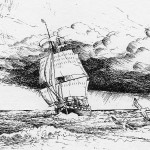When Rye Councillors had the Power
Spelling taken from original manuscripts
1549- Ordered that none of the inhabitants of Rye, young or old should issue out of the town with drums and flags or otherwise, to enter the woods of any man, without his special licence, to gather or cut down any boughs, on pain of imprisonment for three days and three nights.
1561 – It was ordered by the Corporation that no bachelor be allowed to occupy any business within the town, as it was a hindrance to such as be charged as householders who were married; and that no craftsman have any shop in the town, unless he be an indweller. There is no record of this local act having been replaced!

Item. That all victuallers shall be licensed; and that no baker shall be suffered into the town to sell bread, except on certain fixed days, and then only at the Market Cross.
Item. That no victualler, wine-seller, or beer tippler, do occupy the baking of bread and cakes to sell within their houses.
Item. That no tradesman be suffered to open his shop windows upon the Sabbath Day, or to sell anywhere after the bell be rung to the service, on pain of paying seven pence each time of his so offending.
Item. That no matter of thatch, reed or straw shall be laid, after that it be taken off from any house, within the Town of Rye, within 200ft. of the walls thereof.
Item. That every person enjoying an income of £6 13s. 4d. per annum, to have two good buckets of leather, and every person having property within the township of the value of £20 per annum, shall find one good and sufficient hook of iron, for the safeguard of housing in case of fire; and that every inhabitant having £100 per annum, shall have a ladder made 28ft. long.
1652 – On Whit-Sunday the renowed cavalier and author, John Evelyn, visited Rye. He mentions in his diary that having received a letter from Colonel Morley to the magistrates and searchers at Rye to assist his wife at her landing from Paris, and to show her all civility he went, but she appears to have been delayed and he consequently visited Rye Church, which he describes as “a very fair one”. He heard one of the canters who dismissed the assembly without any blessing. On July 11th he was playing at Bowls on the Green at Rye (below the Gungarden) when they discovered a vessel in sight which proved the one in which were his wife and Lady Browne her mother. They had had a hazardous journey, but escaped the Dutch Fleet and reached the Rye Port safely.
1654 – The Grand Inquest of Rye presented three boys for sliding on the ice on the Sabbath Day.
1658 – Claude Gilliat (son of a Frenchman resident in Rye who had been summoned in 1650 for smuggling French silks) was convicted on the charge of having traded as a “haderdasher and grocer” without having served an apprenticeship. He was fined £12. The informer was awarded £1.
1660 – A license to eat flesh in Lent was granted by the Vicar of Rye to Mrs. Mary Thomas for the recovery of her health, to continue for eight days.
1665 – Extract from letter by Rev. John Allin (excommunicated vicar of Rye under the Uniformity Act) to Samuel Jeake “I would also pray you speake to Mr. Allen Grebbell for me about 20s. I hope hee would returne me upon the sale of his hopps wich was not done; he oweth to mee for 2 Election Sermous wn hee was Chamberlain”.
1668 – Extract Rev. John Allin to S. Jeake “I would begg of you . . . . to step over to Winchelsea (Camber) Castle and in the vault there which is underground and arched, and have I suppose gone almost round the Castle; there hangs in very many places under the arch, greate Icicles (as it were) of Peter (saltpetre) which hath-sewered through the earth; I pray get mee as much of it as can be gotten” – Mr. Allins cure in London for the plague.
“Rye’s Own” June 2004
All articles, photographs and drawings on this web site are World Copyright Protected. No reproduction for publication without prior arrangement. © World Copyright 2015 Cinque Ports Magazines Rye Ltd., Guinea Hall Lodge Sellindge TN25 6EG